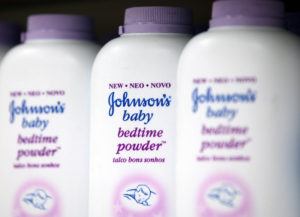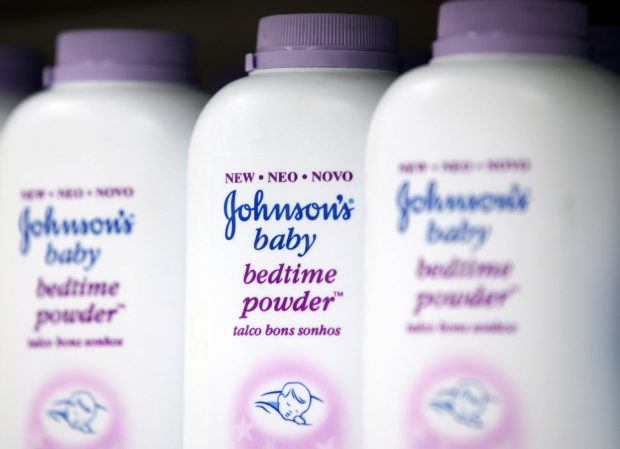Johnson & Johnson, seeking to head off claims by thousands of women that its iconic Baby Powder caused their cancer, took aim at some of the science cited in lawsuits alleging the company’s talc-based products were tainted in the past with asbestos.
During a hearing Wednesday, lawyers for the world’s largest maker of health-care products questioned the procedures used by Dr. William Longo, who tested talcum powder for asbestos. J&J hopes a judge will bar Longo from testifying for the women suing the company in cases consolidated in federal court in Trenton, New Jersey.

J&J said Longo and other expert witnesses for plaintiffs used unreliable methods to conclude the talc products once contained asbestos — a carcinogen — and that exposure could cause ovarian cancer. If U.S. District Judge Freda Wolfson buys J&J’s arguments and knocks out some or all of the plaintiffs’ experts, that would hamstring about 12,000 pending cases.
“Many millions of dollars are riding on how the judge comes down on the question of which experts can testify,” said David Logan, a law professor at Roger Williams University in Rhode Island. “The plaintiffs have the burden of proving the powders caused cancer. If they can’t offer an expert to tell jurors about that issue, the cases go down the drain.”
J&J faces a total of more than 14,000 lawsuits accusing it of hiding Baby Powder health risks for more than 40 years to protect one of its best-known brands. The company’s shares have been under pressure because of investors’ concerns about talc litigation.
Since the first trials started in 2016, J&J has been hit with a series of high-profile damage awards, including a $4.7 billion verdict last year in St. Louis. The company also has won multiple trials over the talc claims and is appealing the Missouri state-court verdict.
The vast majority of the talc suits are gathered before Wolfson for pre-trial information exchanges and test trials. She’s resisted setting any of the consolidated cases for trial while she weighs the viability of the scientific evidence behind the health claims, which J&J dismisses as flawed.
According to court filings by J&J’s lawyers, the idea that talc — even untainted by asbestos — can cause ovarian cancer flies in the face of scientific consensus about causes of the often-fatal disease.
Helping Plaintiffs
Experts like Longo came up with their claims about talc solely to help plaintiffs’ lawyers win their cases, J&J’s said in court filings. The scientists ready to testify for the women “use an unscientific methodology developed for litigation purposes, disregarding well-established distinctions” of what actually constitutes asbestos contamination, the company’s lawyers said.
During a hearing before Wolfson, Longo testified he used the same testing methods J&J employed in the past to check talc samples for asbestos. J&J scientists have used the asbestos-testing methods “since 1974,” Longo said. He’s already testified for plaintiffs in at least a half dozen cases around the U.S.
Allison Brown, one of J&J’s lawyers, said governmental agencies investigating reports of asbestos in talc don’t use the same method as Longo and that Longo, who owns a materials-testing firm, doesn’t personally test talc samples anymore.
Wolfson will have to decide if testimony by experts such as Longo is premised on sound scientific methods and can be considered as reliable by jurors, according to Carl Tobias, who teaches about mass-tort law at the University of Richmond Law School in Virginia.
“It can be difficult for judges to ascertain whether the methods expert witnesses employ are sound because most judges are not trained in scientific methodology,” Tobias said.
The case is In Re Johnson & Johnson Talcum Powder Products Marketing, Sales Practices and Products Liability Litigation, 16-md-2738, U.S. District Court for the District of New Jersey (Trenton).





















 Viewpoint: Runoff Specialists Have Evolved Into Key Strategic Partners for Insurers
Viewpoint: Runoff Specialists Have Evolved Into Key Strategic Partners for Insurers  Machine Learning for Mutuals: What’s Working, What’s Not, and What’s Next
Machine Learning for Mutuals: What’s Working, What’s Not, and What’s Next  10 Do’s and Don’ts of a Smart ORSA Report
10 Do’s and Don’ts of a Smart ORSA Report  AI Claim Assistant Now Taking Auto Damage Claims Calls at Travelers
AI Claim Assistant Now Taking Auto Damage Claims Calls at Travelers 







